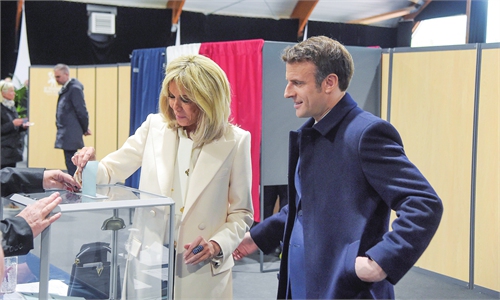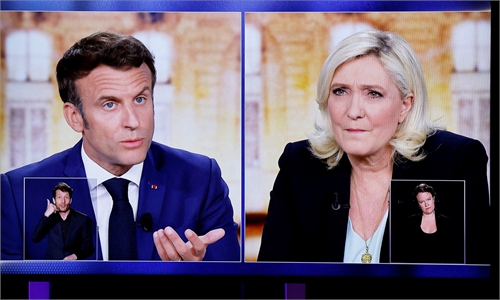A strategically autonomous France is important for Europe: Global Times editorial

Supporters cheer after the victory of Emmanuel Macron in France's presidential election, at the Champ de Mars, in Paris, on April 24, 2022. Photo: AFP
The much-anticipated voting in the French presidential runoff election ended on Sunday. The incumbent president Emmanuel Macron once again defeated his "old rival" Marine Le Pen to win the election, making Macron the first French president to be re-elected in nearly 20 years. The two candidates held entirely different views on issues such as the European Union, relations with Russia, the economy, immigration, and pensions. Therefore, the election was also seen as a "historic" choice for voters to choose between the "two Frances that confront each other."On the surface, this French presidential election is a contest between the centrist and far-right parties, but essentially, it is a competition between European integration and anti-European integration, as well a contest between globalization and anti-globalization. Some Western media said that, if Le Pen had won the second round, it would mean that France would have elected a female president for the first time and the far-right parties would have led the country in an unprecedentedly manner. It is widely believed that such a scenario could have led to a "political earthquake" comparable to Brexit and Donald Trump being elected as the US president. Therefore, after Macron's victory, some French media breathed a sigh of relief saying that the "earthquake" did not happen.
"Strategic autonomy" was the eye-catching label of Macron's first term. As the youngest president in French history, Macron has demonstrated a steady and pragmatic style in domestic affairs over the past five years and inherited France's tradition of independence and autonomy in foreign affairs. He has carefully kept a distance from Washington, believing France and EU should not be forced to take sides between China and the US. Instead, it should become an important pole in a multipolar world. Macron once bluntly criticized NATO, saying it is becoming "brain-dead" and raised the ambitious Initiative for Europe. He also stressed defense autonomy independent from the US, technology autonomy not reliant on other countries, and diplomatic autonomy without subordination to the US. It should be said that France plays an indispensable role in realizing Europe's strategic autonomy and rebalancing international relations.
The reason why the French election this time has global implication is because of current uncertainties in Europe. Europe, once described by Charles de Gaulle as the "Archimedes' lever" of France, is a platform where France can play the role of a major power. But Washington is becoming the biggest influence behind it. Although the Biden administration has repeatedly claimed to "return to multilateralism" and expressed the willingness to repair transatlantic ties, it can hardly conceal its core interest of "America First." From the US withdrawing from Afghanistan to the signing of the AUKUS pact that ripped off France-Australia submarine deal, France and the EU have been made deeply aware of US' selfishness and arrogance. In the Russia-Ukraine crisis that is exhausting the two countries, Washington is attempting to drag Europe to make comprehensive profit.
Against this background, it is very important for France to stabilize its role. The reelection of Macron can at least ensure the continuity and stability of major French policies to a great extent. In fact, the expectations for France, as the leader of the EU and a permanent member of the UN Security Council, from Europe and the whole international society go beyond this. Since the end of WWII, France has played a key leading role at several critical moments in Europe. For Macron, who is holding the banner of "returning to de Gaulleism" and seeking the EU's strategic autonomy, there are challenges, tests, but also ample room in today's France, Europe and the world.
Diversity and multilateralism are in the genes of French culture. Be it during the Cold War or in the post-Cold War era, independent diplomatic routes had brought about huge strategic dividends to Paris. France partially withdrew from NATO in the 1960s and it was the first among Western major countries to establish diplomatic relations with the People's Republic of China. After the end of the Cold War, France was the first Western major country to establish a comprehensive strategic partnership with China. It also prompted the EU to establish a comprehensive strategic partnership with China. Against the background when uncertainties are significantly increasing in the world, China and France share many similar views in terms of safeguarding multilateralism and improving global governance. Strengthening cooperation between the two sides is of vital importance to promote world stability and prosperity.
Improving China-France relations is consistent with strengthening Europe's strategic autonomy. We congratulate Macron on his reelection and expect China-France relations can continue to move forward and China-EU relations can go forward steadily during his second term.



